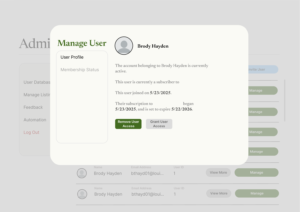
University of Louisville
BSBA in Computer Information Systems
Web Development Track
Aug, 2021 – May, 2025
GPA: 3.80
Programming
This course provides an overview of contemporary information systems, and how they are used in organizations. It presents an introduction to the discipline of CIS and how information systems can be used to create competitive advantage. Topics include application/web development, including the system development life cycle, information security, business process management, and emerging technologies. Students will develop basic web sites including the use of HTML, CSS, and Javascript.
This course introduces object-oriented concepts such as the use of classes, methods, encapsulation, and inheritance. The course concentrates on using object-oriented programming to solve simple problems involving input and output. Computer lab sessions are used to reinforce programming concepts. Extensive programming assignments are required.
This course emphasizes object-oriented software development. Students study the object model and apply it to systems development problems. Topics include polymorphism, inheritance, and object interaction. Event-driven programming of graphical user interfaces is introduced. Application areas may include data structures, searching, sorting, and databases. Extensive programming assignments are required.
This course introduces dynamic web applications and how they are developed. Students will understand the role of client-side and server-side technologies, and use web forms, various server controls and session objects to develop multipage web applications. Students will gain system development experience with current web development tools and platforms.
Data Analysis & Modeling
This project-based course provides students with an opportunity to explore data analysis using spreadsheet and database techniques, including incorporating contemporary decision-making tools in modern spreadsheet software. This course emphasizes the roles of business analysis and knowledge workers through projects and discussions and teaches students how creative use of strong analytical skills can lead to career advancement in any business domain.
This course will provide a solid and practical foundation for the design and implementation of database systems. Emphasis will be on relational database models, with significant coverage of basic relational database concepts, normalization, E-R modeling, locking, SQL, and distributed databases. Additional topics include web database, database security, access control policies and procedures, risk management, and ethical aspects of information handling. Course software includes current database tools such as SQL server.
Systems Analysis & Development
This course helps students develop a working understanding of the differences between information systems and information technology, and how to apply those concepts to facilitate business processes successfully.
Introduces the fundamentals of object-oriented analysis and design, including experience with a CASE tool. Topics include requirements determination, feasibility analysis, modeling with Unified Modeling Language (UML) and data dictionary construction, data modeling and normalization, user interface requirements specification, and information security procedures. Development of problem and design specifications for an information systems project is required. Develops team skills, written and oral communication skills.
Explores strategic development of information technology; value chain analysis and its application to information resource management; information systems planning; organizing, staffing, and controlling the deployment of information technology; the development of an IT platform and architecture consistent with organizational structure.
A continuation of CIS 320, this course focuses on the detailed design and implementation phases of the system development life cycle, including user acceptance testing, test planning, design reviews, and change procedures. Specifications created in CIS 320 are used to implement, test, and install a working version of an information system. System deployment emphasizes a web-based architecture. A prototyping approach is taken to develop and test the system in an iterative manner. Students are grouped into project teams, and each team member accepts task assignments necessary to deliver the information system prototype.
Wireframes – CIS 320






IT & Security
This course provides an introduction to IT infrastructure issues and covers topics related to computer and systems architecture and communication networks, with an overall focus on the services and capabilities that IT infrastructure solutions enable in an organizational context. It gives students the knowledge and skills that they need for communicating effectively with professionals whose special focus is on hardware and systems software technology and for designing processes and solutions that require in-depth understanding of the IT infrastructure capabilities and limitations. It also prepares students for interaction with external vendors of IT infrastructure components and solutions.
Basic notions of confidentiality, integrity, availability, authentication models, protection models, security kernels, audit, intrusion detection, operational security issues, physical security issues, security system life cycle management, personnel security, policy formation and enforcement, trust modeling, risks and vulnerabilities assessment, basic issues of law and privacy, trade secrets, employee covenants, copyright, database protection, software and hardware validation, verification and certification.
Cooperative Education
A new workplace experience in an approved CIS position that offers the student an opportunity for practical application of classroom theory and tools.
A new or continued workplace experience in an approved CIS position which offers new learning and/or additional responsibilities that continue the student’s progression of learning and opportunity for practical application of classroom concepts and tools.